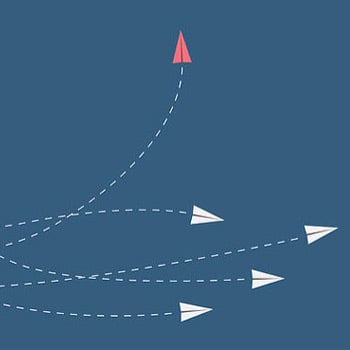

The Power of Mindset in Sales and How to Harness It
Table of Contents

The mindset of every salesperson has the power to drive or destroy sales.
Nothing shapes the future of an enterprise like the mindset of the sales team and sales leadership. The power of mindset in sales must be understood and thoughtfully maximized. There is essentially a "content war" around this crucial topic. Unfortunately, many (most) who speak and write about mindset in sales, quite frankly, are not qualified to do so. Few know what they speak of.
A bold statement? Perhaps. Our experience is forged by assessing, analyzing, debriefing, and coaching thousands of sales professionals from a range of sales environments using the most psychometric sales personality and aptitude assessment science available.
Few “sales hiring and coaching experts” cover mindset in sales effectively. To truly understand mindset in sales, one or both of the following must apply:
- Actual experience. Experts should have experience working directly with a large number of salespeople in varying sales performance settings to develop an enhanced intuition, essentially “reading” another person’s mindset.
- Data analysis. Expertise in comparing and contrasting sales performance relative to sales personality traits coupled with chasing and fully understanding outliers to fully comprehend correlation/causation patterns to develop an increased perspective.
Few have the capacity to develop an “enhanced intuition,” nor have they worked with the appropriate number of salespeople to learn it, nor have they compared and contrasted sales performance relative to sales personality traits.
In other words, there are few true experts with true expertise on Mindset in sales.
Mindset, in general, is a “feel good” topic that many seem to have an opinion on.
The topic of Mindset in sales is quite broad, covering everything from attitude and The Law of Attraction to traditional sales management.
Rather than talk about the warm fuzzy, “feel good” elements of Mindset, this piece will dig into the critical components of Mindset and how you can combine the right salespeople, the right leaders, and the right Mindset to drive success.
Mindset is not important. It is essential to sales success.
To understand how to maximize Mindset in your sales organization, one must begin with the basics. In fact, I’d like to start with a story.
The Tale of Two Shoe Salesmen
The tale of two shoe salesmen scoping an island and reporting back very different findings has been shared for ages…
A British shoe manufacturer sent two salesmen to Africa to investigate and report back on market potential.
The first salesman reported, “No potential here. Nobody wears shoes.”
The second salesman reported, “Send all of the shoes you can! Nobody wears shoes!”
One salesman saw the opportunity. The other did not.
The difference lies in the Mindset of the salesperson.
After building sales teams from scratch and helping Clients select, hire, onboard and coach theirs for several decades, I have witnessed firsthand the power of Mindset to propel or cripple an organization.
Twenty years ago, after building my first sales team, I recognized that some salespeople only need encouragement and leaders to get out of their way. Other salespeople need coaching. Still, others could not close a book in a library regardless of your efforts.
What separates the top sales performers or Sales Wolves from the bottom of the pack?
Mindset.

What is Mindset, Reality?
Merriam-Webster defines mindset primarily as “a mental attitude or inclination” and secondarily as “a fixed state of mind.”
That’s fine, but I like to think of mindset differently. Instead of worrying about literal definitions, think of mindset as one’s operating system or autopilot. Our mindset is a reflection of deeply ingrained thought habits and mental attitudes. Some are malleable, while others are absolutely not changeable; they are hard-coded.
Our thought habits and mental attitudes are shaped through life experiences, childhood, mentors, and beliefs. Some thought habits we are born with (Behavioral Style).
Our thought habits and mental attitudes shape how we interpret and respond to particular circumstances. Autopilot.
Hard-Coded Mindset
Some Mindset elements are virtually impossible to change, nor is it morally right to even attempt to do so.
One’s hard-coded Mindset represents the many and complex deeply-ingrained beliefs and feelings that influence a person to action or inaction under a given set of circumstances.
As the descriptor implies, “hard-coded” elements of Mindset are shaped over years or even decades.
Following is a list that scratches the surface regarding potential Hard-Coded Mindset shapers:
-
The country, region, state, and community in which the person was primarily raised.
-
The presence or absence of:
-
Powerful mentors
-
A loving two-parent household
-
Role models and key influencers who believed in the person
-
Significant emotional trauma
-
-
The general socio-economic conditions in which the person grew up.
-
A near-death experience or the death of a loved one.
-
Carrying the responsibility of being a single parent.
-
The Behavioral Style with which a person was born.
-
The Driving Forces or Motivators shaped through life circumstances and influential people who shaped a person's long-term "Why" (Their purpose and passion in life).
Some salespeople see opportunity everywhere, and their perspective becomes a self-fulfilling prophecy.
Others see challenges and everything that could go wrong instead of opportunity. These salespeople avoid risk-taking and accordingly take little or no action. One’s mindset becomes a self-fulfilling prophecy.
Each of the previously-mentioned catalysts may leave a positive or negative “emotional mark” on one person while seemingly having little or no impact on another. Various circumstances affect the “mindset switches” that flip up or down to share the habitual course of action that results in someone’s mindset. These can include various circumstances, how someone interprets their life events, the support/influence of parents or family and friends (or lack of).
We have found that some elements of a Hard-Coded Mindset are legally and objectively measured and are highly predictive of future sales performance. These hard-coded elements of Mindset include:
-
Behaviors
-
Driving forces (motivators)
Behaviors and Driving Forces may be objectively measured using a valid sales personality and aptitude test.
Mental toughness or “grit” comes from the appropriate mindset switches being “turned on” (resilience, self-starting, goal achievement). Adversity either enhances or erodes mental toughness.
Soft-Coded Mindset
Soft-coded mindset elements are malleable habits of thought that coaching may reshape into improved thought habit patterns if the person is open to this possibility. Those who are open to and study how to improve their perspective through self-help are essentially re-coding their soft-coded mindset.
Several objectively measurable, Soft-Coded Mindset elements may be shaped:
-
Acumen (perception of the world around them).
-
Competencies or developed skills in the areas of:
-
Personal Accountability.
-
Focused Goal Orientation.
-
Self-Starting.
-
Resilience Skills.
-
-
Emotional Intelligence (EQ).
These previously-mentioned soft-coded Mindset elements may be objectively measured using valid sales personality and aptitude testing.
Additional Soft-Coded Mindset elements include (but are not limited to):
-
Belief in:
-
The mission, vision, and values.
-
Fellow team members.
-
Product/service and what they do for the Customer. Resilience Skills.
-
-
The quality of home life.
-
The presence of limiting beliefs.
-
The use of negative or positive self-talk.
-
Use of the Law of Attraction to hack negative thinking.
-
The use of ego hacks to keep the ego in check.
-
The level of respect and admiration of the Sales Manager.
The source of a salesperson’s “mojo” (self-confidence, resilience, and self-assuredness) is primarily found in soft-coded mindset elements that may be developed and reinforced by the salesperson and their sales manager.
However, there will be no mojo if the salesperson lacks the hard-coded mindset elements of Behaviors and Driving Forces (Motivators) and is held accountable for achieving sales performance.
The “Right” Mindset.
The “Right Mindset” depends upon possession of the appropriate Behavioral Style and Driving Forces (Motivators) requirements of that particular sales role.
-
Some sales roles require the Behavioral Style or ability to prospect and overcome social rejection repetitively (the classic sales hunter).
-
Other sales roles require a Behavioral Style that is more repetitive people engagement, where relationship-building is essential (farmer).
-
Still, other sales roles combine the two into account management, focusing on relationship building and some level of prospecting (hunter-farmer hybrid).
While the required Behavioral Style may vary by sales role, most sales roles have a very tight combination of required Driving Forces or Motivators, including:
-
Resourcefulness. They are driven by practical results, maximizing efficiency and returns for their time, talent, energy, and resources investments.
-
Commanding. Driven by status, recognition, and control over personal freedom.
-
Intentional. They are driven to assist others for a specific purpose, not just for the sake of being helpful or supportive.
-
Intellectual. Driven by opportunities to learn, acquire knowledge, and discovery of truth. Objective. Driven by the functionality and objectivity of their surroundings.
-
Objective. Driven by the functionality and objectivity of their surroundings.
Good sales managers select, hire, onboard, and coach salespeople with the requisite Behaviors and Driving Forces combination (Hard-Coded Mindset). These sales managers are constantly working to help their salespeople strengthen their emotional intelligence (EQ) and the following key Competencies (Soft-Coded Mindset):
-
Personal Accountability
-
Focused Goal Orientation
-
Self-Starting
-
Resilience
Hard-coded Mindset challenges like a job mismatch between the salesperson’s Behaviors and Driving Forces rarely turn out well despite significant coaching efforts. One cannot change the hard-wiring and hard programming that God and years and years of shaping create.
Check out our powerful article: Types of Sales Wolves: The Hunter Sales Wolf and the Farmer Sales Wolf.
The “Wrong” Mindset.
The Wrong Mindset can be tremendously negative, whether at the CEO, sales management, and salesperson levels. It is incredibly expensive in sales.
Warm and fuzzy do not translate into sales performance.
The wrong Mindset in salespeople.
When salespeople do not possess the Behaviors and Driving Forces (Motivators) or “sales personality” essential to perform in a particular sales role, they likely have the wrong hard-coded Mindset.
This is essentially a universal truth.
Companies across the globe with some level of local or national market power, in many cases, are not worrying about the wrong Mindset. They have the margins or sense of complacency that they are not particularly concerned about understanding why some salespeople perform well while others do not.
In their perspective, underperformance isn’t anything particularly grievous.
In many sales teams, 80% of all sales performance comes from 20% of all salespeople. This should be a warning bell to take immediate action.
Unfortunately, many companies view this as usual if they are even aware of this relationship.
The wrong Mindset in the CEO / sales management.
If the CEO and sales manager do not possess a similar “hard-coded” mindset to their Sales Wolves, they will not have credibility, let alone earn respect. Without respect, they will not be able to lead Sales Wolves effectively, nor will they push their sales team members, particularly non-Sales Wolves, properly. The result? Sales Wolves flee for leaders who think like they do, leaving average and low performers. This breeds a cycle of mediocrity. Mindset at the CEO / Sales Leadership level is everything.
Ultimately, the primary reason why bottom performers fail to perform is the wrong Mindset (particularly hard-coded Mindset).
Theirs, the CEO’s, and that of sales management.
CEOs and sales managers can either respect the relationship between Mindset and sales performance or pay the consequences, namely, missed sales.
Not all sales performance issues are due to job mismatch, particularly when it comes to hard-coded Mindset or sales personality. Many sales performance issues are caused by the loss of the salesperson’s “mojo” (soft-coded Mindset). Leaders may overcome Soft-coded Mindset challenges with strong sales management, sales systems, and sales culture.

Mindset is your second most valuable asset.
A lack of understanding is a significant challenge facing the recognition of Mindset as a critical component of sales (and ultimately, organizational) success. Mindset, thoughts, drivers…for many CEOs and sales leaders look at Mindset as a vague notion rather than a quantifiable component of successful salespeople (not to mention sales managers and CEOs).
Mindset is quantifiable, and those who fit the sales role from a sales hiring scorecard perspective significantly impact sales success. Because so few organizations recognize this, Mindset also has the potential to become your “secret weapon” of sorts.
Unreal expectations typically prove themselves…unreal.
Generally, people operate within the parameters of their hard- and soft-coded mindset. Certain life events can drive salespeople to later perform at a sales performance level that is entirely outside the range of their Behavioral Style, but this is infrequent and rarely permanent. While romantic, it is not efficient to seek these outlier situations. Instead, it is highly recommended to stick with the sales hiring scorecard (Experience, background, education, and sales personality).
There will always be outliers – those who seemingly perform outside of the normal parameters of their sales personality and sales hiring scorecard. These people are very few and very far between. It is wise to study your outliers to identify potential changes in the sales hiring scorecard, plus best practices that may become part of the sales process and shared with others.
The Sales Wolf Mindset.
A Sales Wolf is a salesperson who is wired to perform well in a particular selling situation. A Sales Wolf achieves top 20th percentile sales performance. Due to their job fit and passion, they outsell 80% of the rest of the sales team. Sales Wolves often make or break sales and usually carry the sales team.
Behavioral Style Dimensions and sales success. Examining Behavioral Style Dimensions, there are four People-Task perspectives.
- Task – Tell (Extrovert) – Focus on Task – “Tell” is extroverted
- People – Tell (Extrovert) – Focus on People – “Tell” is extroverted
- People – Ask (Passive) – Focus on People – “Ask” is introverted
- Task – Ask (Passive) – Focus on Task – “Ask” is introverted
Each of us possesses a blend of these four Behavioral Style Dimensions. It is romantic to believe that a passive Behavioral Style combination will be successful in sales. It is scarce.
Depending on your particular sales roles, you will ideally seek to select and hire salespeople with the requisite Behavioral Style Dimensions.
- Task-Tell. At one end of the spectrum are sales roles requiring heavy prospecting and challenging the status quo, which involves significant social rejection and task focus (Task-Tell). The greater the need for prospecting, the greater the need for a more Task-Tell Behavioral Style.
- People-Tell. Sales roles that require a strong relationship focus and warmth are at the other end of the Behavioral Style Spectrum (People-Tell). Some sales roles require a strong “Task-Tell” Behavioral Style for success, while others require more “People-Tell.”
Many sales roles require BOTH relationship-building AND the ability to prospect successfully (Task/People – Tell. Note that neither recommended Behavioral Style combination identifies an introvert.
Introverts rarely sell in any sales role/environment.
We would call the super hunter at one end of the “people-task spectrum” of Behavioral Style. The super hunter Sales Wolves must deal with highly repetitive social rejection. To do so successfully, these salespeople must possess a high task-tell Behavioral Style combination that helps them overcome repeat rejection.
The desire to win (or not to lose) must figure strongly over the desire to avoid social rejection. Super hunter Sales Wolves have short attention spans and fast feedback loops that quickly inform them of what is not working and how to adapt their approach.
Subtle mindset changes make a huge difference.
This is why data analysis comparing sales personality and aptitude results to Key Performance Indicators is essential. There are always, always conditions we refer to as “edge factors” that can make or break a salesperson’s performance.
It is essential to understand these factors to learn more from them, screen for them, and then interview, onboard, and coach them where applicable.
Following are some examples:
BEHAVIORS
If a candidate’s or salesperson’s people-focus is too strong, social rejection will become an issue. Also, some prospects may see salespeople with a People-Tell focus as glib and not credible.
DRIVING FORCES
If the “Resourceful” driving force is too high relative to the “Commanding” force, candidates may exhibit entitlement thinking, where they expect to be compensated without actually achieving results. If the Commanding is beyond a particular point, the candidate may seek advancement/leadership opportunities. This can become problematic if no advancement/leadership opportunities are likely. The candidate will eventually become frustrated, which can lead to a host of potential issues.

Why Sales Teams Do Not Discuss Mindset at All
Every human being is impacted by Mindset. Every human being has the potential to reap the benefits of shaping and harnessing their Mindset.
Yet, the vast majority of sales teams and leadership do not discuss Mindset at all. This is most definitely to their detriment.
Mindset drives sales performance. The creation of awareness of the possibility of shaping one’s Mindset (and that of others) further separates the top sales performers from the bottom because Sales Wolves improve their performance through mindset mastery.
It puts it on the table. It helps sales team members share best practices – books, ideas, and the ability to engage, encourage and hold one another accountable.
This is true for three (3) reasons:
- Few sales teams are actually led by sales management and, in turn, CEO leadership, who themselves are Sales Wolves.
- Many (if not most) in sales management do not even realize that mindset shaping is a possibility. They believe “mindset” is about choosing one’s attitude and is a personal responsibility for each salesperson to figure out independently.
- If they are aware of such mindset-shaping concepts as the Law of Attraction and “growth mindset,” they believe them to be little more than happy talk.
Furthermore, sales is a field dominated by men. Men often have mental barriers to asking for help. There is a wide range of opinions and paths to mastery of one’s Mindset. None are particularly formalized. Therefore search costs are seemingly high.
As a result, most simply back away and (errantly) focus on tactics and strategy.
The lack of discussion around Mindset starts with leadership.
There are a precious few CEOs and sales leaders I can coin “Get-it” leaders. Among others, one of the most defining characteristics of “Get-it” CEOs and sales leaders is that they proactively and continuously seek ways to improve their sales talent, sales systems, and culture. They themselves are typically Sales Wolves and possess those characteristics that define this incredibly successful, powerful subset of sales talent.
Get-it CEOs and sales leaders seek to improve their sales talent through the recognition and development of Mindset.
Get-it CEOs and sales leaders recognize the importance of Mindset and possess the requisite successful Mindset themselves.
The less of a Get-it CEO and sales leader, the less likely they are to acknowledge the power of selecting and hiring only salespeople with the requisite hard-coded Mindset. Get-it sales leaders understand the power of shaping their Mindset and that of others. This is a considerable distinction.
Non-Get-it CEOs and sales leaders do not GET mindset-shaping. True Get-it/Wolf Class CEOs/sales leaders/salespeople embrace Mindset and work to improve how they actively shape theirs.
The lack of discussion around Mindset starts with leadership.
The reason is simple. Many, perhaps most, salespeople and sales leaders have no business being in sales. I have been in front of CEOs who have not sold previously. They often cannot sell, and their Sales Wolf leaders and salespeople smell this. There is a code between the Sales Wolf and the CEO.
Most CEOs and sales leaders are lousy salespeople themselves. This spells mediocrity in their sales teams. Wolf class salespeople and sales managers push themselves. They are constantly seeking a better way.
Non-Get-it CEOs and sales leaders who are not actual Sales Wolves themselves totally miss the boat when it comes to Mindset. They lack the capacity to get it – to appreciate the power of shaping not only their Mindset but that of their Customers and Prospects.
Therefore, they lack the capacity to coach mindset mastery. They lack the credibility needed to lead their Sales Wolves because the one thing a Sales Wolf knows is a poser. Actual Sales Wolves can smell a never-gonna-get-it, a non Sales Wolf, and they do not take counsel from these people.
To do so would jeopardize their Mindset and future success.
Furthermore, mindset shaping is intensely personal. It is a private matter where human beings face their inner critics and demons and learn to reshape the way they think to snarl back and thrust two middle fingers towards what holds them back.
Sales Wolves understand that Mindset is the final piece of the puzzle.
True Sales Wolves are rare. Less than 20 percent of all salespeople have the capacity to be what I call a Sales Wolf. They possess the hard-coded Mindset – the requisite sales personality and background combination that make them insatiably hungry for their successive win. They hate losing more than they love winning. Winning is an art form rather than just a number.
Sales Wolves are starving for attention to discuss Mindset.
I find that when a Sales Wolf identifies another Sales Wolf, they quickly share books, seminars, podcasts, and ideas. They cross-pollinate their mindsets to advance their own.
The power of one’s Mindset—the awareness that one’s mindset influences sales performance; the mindset difference between success and failure—this realization occurs ONLY after a Sales Wolf has mastered many, if not most, of the straightforward elements of the sale. This includes the scripting, the proposal, the meeting, the cold call, and prospecting.
Mindset is mastered only after hitting multiple brick walls and noticing that the ONE thing left is how they think. Once these areas become mastered, many Sales Wolves realize the next frontier to master is their Mindset.
And the Mindset of a Sales Wolf is a challenging frontier to tame for many because the very strengths, the perseverance, the drive, and the problem-seeking often damage the mojo of the Sales Wolf. Too much good medicine can turn bad unless it is well-harnessed.
Once a Sales Wolf realizes they may harness the power of their mind, they focus relentlessly on shaping theirs.
Every role a human being can work in has some alignment potential between the human being and the position. Every function has the potential to have “Wolf-class talent” mastering that role and driving performance higher than ever before.
Organizations that recognize and nurture the power of Mindset realize this potential.

Mindset and sales leadership
Poor mindset amongst sales leadership rots the sales team from the core out. Losing becomes acceptable. True Sales Wolves hate losing more than they love winning.
“Show me a good loser, and I will show you a loser.” - Vince Lombardi.
When CEOs and sales leaders have a poor Mindset,
They lose. A lot.
Their sales teams lose—a lot.
When poor Mindset pervades sales leadership, any Sales Wolves there leave — and do so quickly. A true Sales Wolf cannot flourish under a non-Get-it / non-Sales Wolf leader.
Unfortunately, I have personally observed this painful reality. Usually, it occurs in larger, multi-division / multi-region sales territories where a non-Sales Wolf leader may be allowed to “hide” amongst the many.
This is why reviewing Key Performance Indicators at the CEO-level down is essential. Otherwise, non-Sales Wolf sales leaders may get in and wreak incredible damage to a sales team through nepotism, favoritism, and their ilk.
Apathy or disdain toward Mindset will drive away your Sales Wolves.
I have observed apathy and disdain toward the Mindset of winning because only specific salespeople have the capacity while others wish they had it.
I have observed Sales Wolves realize they are “smarter” than their sales leadership, and their sales leadership will never be at their level. These Sales Wolves quickly evaluate their options and often seek opportunities elsewhere to be fully engaged. In rare instances, they become part of the problem.
I have seen it before, innumerable times.
Sales Wolves leave. The potential of the sales team is not realized. Price is sold instead of value. Profits are not maximized. Customers go elsewhere. Sales Wolves know it is best to short their stock and leave.
Ultimately, shareholders lose.
Unfortunately, this happens all the time because few are willing to deep dive into the care and feeding of Sales Wolves. Few are eager to study what it takes to maximize the quality of their sales talent and sales hiring programs and develop customized coaching programs that deep dive into mindset-shaping to drive sales performance.
The competition is poaching your Sales Wolves.
A female CEO who knows her competition is poaching her best salespeople. Every sales team that is not using a sales hiring scorecard with sales personality testing backed by brain research allows low performers over 80 percent of the time. When sales leaders do not get it and are not a Sales Wolf themselves, the 20 percent of actual Sales Wolves are not adequately engaged, pushed, and cared for.
Ultimately Sales Wolves leave non-Sales Wolf leaders and CEOs. They leave while the 80 percent who are lower performers stay. Show me CEOs or sales leaders who are not “wolf class,” and I will show you a sales culture that fosters mediocrity.
And mediocrity equals poison.
Thanks to powerful recruiting platforms like LinkedIn, the search costs for Sales Wolves are lower than ever. This means an actual Sales Wolf has many options.
True Sales Wolves hate losing more than they love winning.
True Sales Wolves expect to work for Get-it or true Sales Wolf CEOs and sales leadership. Sales Wolves learn from and are motivated/inspired by fellow Sales Wolves. This is a universal truth.
When a Sales Wolf leader or CEO leaves, the engagement of Sales Wolf salespeople withers. The call from a recruiter with the promise of a brighter future becomes compelling. Interviews with a competitor or another Wolf-Class company will draw a Sales Wolf away if they suspect their status quo is in jeopardy.
In the long run, true Sales Wolves leave in packs leaving the mediocre sales talent behind. True Sales Wolves can smell weak leadership, and while they may stay for some time, they always, always go. The weaker salespeople cannot stand Sales Wolves as much as Sales Wolves cannot stand weaker salespeople. Think oil and water or kryptonite. This is a universal truth.
When Sales Wolves flee this mediocrity, low performers are all that remain, and they often pump one another up, proclaiming they are Sales Wolves to give themselves confidence.
Mindset is challenging to quantify.
The real problem is that accounting conventions do not measure the opportunity cost of having a mediocre sales team. Essentially, they cannot compute the value of Mindset. I promise if they did, Mindset would be in the titles of every leadership and sales book for the next ten years.
The impact leadership has on the Mindset of a sales team is everything. All problems start at the head. The tone, the culture are set from the top. In turn, all problems walk on two feet. If leadership allows mediocrity in the sales team, top-performers leave while mediocre salespeople remain. Customer value creation withers and sales eventually drop.
It is not possible to have a successful sales team without the right Mindset at the top. Not in the long run.

Mindset among your sales team
Other than your intellectual property (IP), the collective Mindset of your organization is its most valuable asset -- particularly the Mindset of your sales team.
There is no middle ground. A sales professional’s Mindset is either working for or against the interests of the company.
A proper mindset is crucial and rare for top sales performance. Different sales roles require different mindsets. Without the right Mindset, which includes the requisite Behavioral Style, Driving Forces, Acumen, and Competencies, salespeople cannot possibly be successful Sales Wolves.
Resiliency, Goal Orientation, Self Starting, and Personal Accountability are essential competencies true Sales Wolves develop and possess.
A sales team always possesses a “group mindset.” The question for any organization is this: Does your group mindset drive sales or lead to missed opportunities?
All problems start at the head. All problems walk on two feet. The tone is set at the top. Whatever the CEO and sales management tolerate in terms of ultimate sales and the activity level that drives such, the sales team shall too.
At one end of the spectrum, True Sales Wolves push others like them to new heights. They emulate one another to greatness.
At the other end of the spectrum, mediocre salespeople comfort one another to continue their mediocrity path. Human beings are comfort-seeking creatures.
It’s essential to consider this word of caution: The most astute sales leaders and CEOs are too close to their worlds to possess the necessary objectivity. As a result, it is only human to become biased and, ultimately, part of the problem.
Challenges preventing optimization of your sales team.
In most sales teams, there are multiple areas of optimization to be realized. Sales teams are typically so insular that they do not and cannot recognize or understand the areas needing improvement. In other words, they do not know what they do not know.
Their world is the only world they know.
In these instances, except sales performance from the prior year and quarter, those in sales leadership have little or nothing to compare their sales teams to, and unless things are particularly bad, they do not improve.
Relationships pose another challenge to the sales team. Of course, relationships are essential. They are the “glue” that helps sales teams thrive.
Although solid relationships are beneficial, they often cloud perspective and stand in the way of improving sales performance. They frequently “win” the accountability vs. relationship battle.
The fear of missing numbers.
To make matters worse, sales leaders are often very short-term-sighted. Reactivity is rampant, with sales teams operating without a proactive, strategic plan. These sales leaders do not make proactive changes to their sales engine because they are likely to bring some type of short-term pain.
Choosing not to replace a mediocre sales performer is a very common example of this circumstance. The pain of keeping the mediocre performer is not great enough to take action, so the sales leader does not seek a replacement. Searching for the right salesperson (a Sales Wolf) could mean not having anyone in that territory/region for several weeks or months as a new salesperson is selected, hired, and onboarded.
The fear of missing numbers often skews the focus to the short-term instead of the long-run -- where it should be. A problem that could easily be fixed in the short-run at a small cost becomes a baked-in, long-term problem that is all-too-often never addressed.
For most sales leaders, when change translates into any type of sales interruption in the short-run, much needed improvements are almost indefinitely postponed.
The sales team mindset doom loop.
There are three realities that weigh on both the short- and long-term performance of many sales teams.
- Talent. Many salespeople do not possess the proper sales personality and aptitude to perform well in their sales role.
- Systems. The sales systems used in many organizations are most often woefully underwhelming. Specifically, they are not systematic, best practice or optimized, nor is there accountability if the systems are not followed.
- Culture. Put simply, the sales culture is not accountable.
Ultimately, these three contributing factors become a self-fulfilling doom loop.
Sales leadership cannot hold mediocre salespeople accountable because they fear they may quit. This results in missed short-term sales. Many in sales leadership and the C-Suite believe that it is better to have at least some sales performance in the short-run than to have no one selling.
It gets worse.
Mediocre sales performance and lax systems accountability is kryptonite to true Sales Wolf performance. Allowing mediocre sales performance is a virus that infects the mindset of Sales Wolf Managers and true Sales Wolves. Why should a Sales Wolf struggle and do the grind for the same or similar money as low and mediocre salespeople?
Remember, true Sales Wolves typically represent 20 percent of the sales team and achieve 80 percent of the results. They are not stupid. They realize they are subsidizing the sales organization. They see what they should be making instead of covering low and mediocre salespeople.
The result?
Some choose to reduce their contribution. Others leave for organizations that will compensate them what they are truly worth.
The feedback loop and a successful sales mindset.
Struggle and the grind are essential contributions to sales success. Each supposed failure in approach, tactic or strategy can be a powerful teacher, but only with the right mindset, acumen and approach. Most salespeople avoid the grind and struggle because they cannot handle the emotional friction of rejection and being wrong.
True Sales Wolves run toward the opportunity to grind, struggle and learn because that is how they are wired. Their mindset not only can handle the struggle, they seek it. True Sales Wolves view the grind and struggle as essential parts of improving.
Every failure is an opportunity to learn and improve for a true Sales Wolf. We call this the “feedback loop.” True Sales Wolves learn from failure and use it to improve in real time.
The mindset of a Sales Wolf.
Technically-speaking, there are a multitude of contributing factors that shape the mindset of a true Sales Wolf. In particular, Sales Wolves must possess the right combination of Behavioral Style, Driving Forces, Acumen and Competencies. They must also possess the following:
- Mindset habits. True Sales Wolves properly channel negative self talk. Their inner voices speak candidly in a language of personal accountability. They manage their energy throughout the day, week, month and quarter. They are self aware of their strengths and growth opportunities.
- Effective sales management. Nothing accelerates a true Sales Wolf more effectively than working with a true Sales Wolf manager. Like attracts like, and like drives like. This is rare, but is a particularly powerful driver of Sales Wolf success. A true Sales Wolf Manager will not only expect top sales performance, they will expect the requisite activities and mindset that are essential for success.
- Prior experience. True Sales Wolves learn best from wolf-class organizations and true Sales Wolf managers. This is key to accelerating sales performance where possible.
Salespeople with strong business acumen possess a greatly-increased potential to “see” their client problems in a business 3D perspective. They have the increased ability to identify and articulate solutions that most do not see.
Salespeople without strong business acumen are often left to scripting that hits but mostly misses the mark. Or, they do not attempt to add value, as they lack the capacity to do so anyways.
Few salespeople have a complete Driving Forces combination coupled with prior experience. We can identify the extent of which a salesperson possesses business acumen.
Together, this is an almost magic formula, where the salesperson has the potential to create significant value beyond the product / service.
Recognize and understand the mindsets of your sales team.
Successful Sales Wolf managers get into the heads of their sales team to best prepare their salespeople for success. Key to successfully doing so is direct prior experience in similar sales roles, coupled with powerful psychometric sales personality and aptitude assessments.
Every sales role has an ideal combination of Behaviors, Driving Forces, Acumen and Competencies. For each sales role, we develop a Job Benchmark that represents the ideal combination. The extent of which a salesperson matches the Job Benchmark is characterized as Job Fit or Job Match. If the Job Fit or Match is not strong enough, it will almost always translate into some sales performance tradeoff. A coaching plan may be developed and implemented if the Job Fit is strong enough.
Thanks to powerful advances in psychometric sales personality and aptitude testing, it is possible to objectively measure the sales personality of every salesperson and identify their degree of fit to sales job benchmarks. With this awareness comes the opportunity to move sales team members into better suited roles and regions. Coaching plans may be fully customized to provide each salesperson customized guidance and feedback to help them improve their performance.
Many CEOs and sales managers like to say they know their sales talent, but the unfortunate reality is that precious few actually possess the necessary depth of knowledge. I have yet to meet a human being who can quantify Personal Accountability or Level of Altruism after working with that person for any period of time.
Ego and human bias are the enemy here.
We human beings fall in love with those we work with, warts and all.

Recruiting a team of Sales Wolves
So many believe they have some magical skill or gift in identifying top sales talent. Yet, so many salespeople (and sales teams, and ultimately, businesses) fail.
You will be hard pressed to find anyone who can consistently out-select a solid sales selection process that incorporates a sales hiring scorecard that objectifies the interview, prior experience, education, background and sales personality.
In God we trust, everyone else bring data.
The key is to establish a sales hiring scorecard and never deviate from it with the exception of controlled feedback loops to incrementally improve.
How to attract Sales Wolves with the right mindset.
The sales interview panel - hiring the best salesperson possibleThe best way for a business to attract Sales Wolves is to have a reputation of only selecting, hiring, on-boarding, coaching and developing Sales Wolves. This requires emotionally intelligent Sales Wolf management and CEO leadership.
It is critical to train and condition sales recruiters, HR and sales leaders to follow the sales selection and hiring process without fail. Failure to follow the sales selection and hiring process should be a terminable offense.
Most organizations fail at sales recruitment for two (2) reasons:
- The recruiters do not fit the Job Benchmark for recruiting salespeople. The best recruiters possess the sales personality of a hunter. Like attracts like when it comes to recruiting salespeople.
- Most organizations have a strict budget for recruiting that does not scale with the needs of the sales organization. When the need for salespeople outpaces the ability to recruit only Sales Wolves, something has to give. Usually what “gives” is the quality of sales talent hired, which only worsens the problems causing a lack of budget in the first place.
Job postings must use the type of language that is consistent in attracting the needed Sales Wolf for a particular sales role. Each sales role has a relevant Job Benchmark associated with it. Some sales roles are more task-oriented, short in sales cycle, one-call close, etc. Others require more of a relationship approach for extended periods of time. A more task-focused, results-driven, get-paid-to-slay-it ad is going to attract those with this mindset.
It is essential that job descriptions and marketing (ads) are purposely written to attracted the desired type of sales candidate who can perform in that particular sales role and repel the rest. For example, an ad that is more relationship-focused in language will accordingly attract more people-focused candidates.
Identify Sales Wolves during the vetting process.
A Sales Hiring Scorecard objectifies the measurement of relevant background, experience, education, certification(s) and sales personality combination necessary to perform in the sales role.
The single most important step in the selection of Sales Wolves is to develop a Sales Hiring Scorecard and use it for every sales hire.
- Does the candidate fit the education requirement? Yes or no?
- Does the candidate fit the experience requirement? Yes or no?
- Does the candidate’s sales personality (Behaviors, Driving Forces (Motivators), Acumen and Competencies) match the Job Benchmark? Yes or no?
If just one area of the sales hiring scorecard is deficient, absolutely do not proceed with that candidate!
Most job interviews are a waste of time.
Most sales interviews are a waste of time because the questions are unstructured and candidate responses are not consistently scored.
These questions can help you conduct more effective job interviews:
-
Tell me about your first sales job. Quite often this is a “job” in grade, middle or high school like delivering newspapers, yard care, door-to-door sales, etc. Candidates who took initiative as young entrepreneurs always stand out.
-
How did you perform in your last two sales roles? The best salespeople know how they performed, ranked and their awards.
-
What do you do when you lose? This is your chance to hear about mindset habits in potential sales talent when candidates discuss how they learn from loss and quickly moving on.
Check out our popular article - Hire the best salespeople with three powerful interview questions.

Company culture and mindset
Culture is a fairly popular topic for businesses right now. Many businesses are aware of its importance, while simultaneously harboring (even nurturing) a negative culture that kills the play-to-win mindset (ultimately, destroying mojo) of top performers, who essentially give up or give in to mediocrity.
Or, your Sales Wolves leave for a company that plays-to-win.
This negative cycle is self serving, and is often never ending (until, sadly, the demise, sale, or mass firing of or within an organization).
Some of the primary reasons why include:
- Complacency.
- Comfort.
- Lack of a fire burning their metaphorical boats.
These are utterly avoidable and correctable, but getting off the negative feed cycle can be difficult. Ultimately, the company culture is set by management, particularly the CEO, and is executed through talent.
Remember, all problems start at the head, and all problems walk on two feet.
The key to winning in sales begins at the top - female CEOMany companies pride themselves on a powerful company culture, not understanding how A) toxic the culture is in reality, and B) how it is impacting their bottom line. They are simply oblivious. No company sets out to foster a culture of low performance and/or mediocrity. Instead, it often just happens organically.
It often takes an outsider like a skilled consultant, or perhaps a particularly astute new hire (and subsequent low retention rate of top talent) to expose a negative culture. Even then, many organizations are in denial or paralyzed by the reveal.
When companies are founded, friends and family are often hired to help build the company. Those months and years are important, and trust among the team is especially critical. Therefore, it only makes sense that many business founders start with family and friends.
As the company grows, comfortable in that level of trust, talent is oftentimes hired without the necessary level of scrutiny. Teams expand with employees who are underachievers, poor fit employees, and in particular, not Sales Wolves.
These people become part of the company story and family. As a result, most become untouchable. Subsequently, bad habits are allowed to become permanent practice. Then competition enters, the market or technology changes, and self analysis becomes necessary.
Few companies will do this hard work of self analysis, and fewer still will do what they sometimes need to do - make changes in their mindset, leadership and talent.
This is how mediocrity becomes baked into the culture of a company and unfortunately sentences many to mediocrity or the road to doom. This is most often the rule and not the exception.
But, there is always the exception. In this case, the exception is the company that pushes the envelope because the founder, leadership, ownership and talent collectively push the engine to the limit. But this is rare.
Sales Wolves suffer in poor cultures.
Most sales organizations have a Sales Wolf or two who are paying the bills. These Sales Wolves are bringing in 80-plus percent of the sales revenue, and are subsidizing low-performing salespeople. This is a serious potential mindset killer. This occurs especially often in sales organizations that lack a Sales Wolf sales manager. Like attracts like.
Strong cultures build the processes and staff to succeed. Poor cultures support the elements mentioned above: complacency, comfort and a lack of fire. Sooner or later everyone is rational about their contributions and what they receive in return.
The greatest frustration for top-performing Sales Wolves occurs when they realize that no matter how hard they work, and no matter how hard they outsell, their compensation is capped at an artificially low level.
Sales managers hold the keys to unlock play-to-win mindsets.
The key to maximizing sales is to select, hire and onboard salespeople who play-to-winAll salespeople have untapped and often unique potential - there are no exceptions to this rule. The role of a sales leader is to tap into and maximize that unique potential. How this is best accomplished is a function of whether or not the sales leader has the respect of the Sales Wolf and the quality of sales talent.
Ultimately, the best engagement of a Sales Wolf occurs when the sales leader is a Sales Wolf themselves. Like attracts like.
To maximize engagement and as a result, performance, Sales Wolves need to know that their managers:
-
Believe in them.
-
Will show them the way.
-
Have their backs.
-
Are Sales Wolf Managers themselves.
Sales Wolves eagerly engage in mindset-development activities. Why? Because they fully realize the power of their mindsets on their success. In fact, they have studied their mindsets (they may refer to it as another name) with the intention of minimizing their lows and maximizing their highs. Sales Wolves are constantly seeking an edge to improve their mental games, because that translates into getting more success and income.
Opportunities to digest and use this type of content abound in today’s connected society.
Podcasts, blogs, vlogs, videos, webinars, seminars, books, and more engage other Sales Wolves to learn what content they are consuming.
Sales Wolves are inherently seekers of knowledge. This is particularly true with knowledge that maximizes their mindsets, to maximize their lives and sales performance.
Sales Wolf Managers and Leaders always push mindset development amongst their staffs. They compare and contrast their content consumption and outcomes with like-minded people who in turn compare and contrast theirs.
What do you do when salespeople fail to live up to the culture code?

Building a sales team from scratch
In the previous section, I walked you through the typical team-building path among organizations. As well as why that cripples promising organizations and prevents them from achieving real success.
When it comes to building a sales team from scratch, there is only one opportunity to get it right. But few organizations do it well.
The trust and history that is built by founding your company with friends and family can be difficult to stray from as you first find those glimmers of success. But successful leaders can look past their companies as their “babies” and look strategically at what is necessary to reach subsequent stages of growth.
It starts with a simple, but critical question. Are you or your family/friends really the best possible choices to help your company continue to grow?
Finding and hiring Sales Wolves is not easy. It is complicated and often takes longer than the hiring process for many organizations. But it is a critical component of your short- and long-term strategy.
Start here when building a sales team from scratch:
Ask yourself the following four questions when building a sales team from scratch:
- What kind of sales team mindset do I want to nurture?
- What is my business?
- How important are profits?
- How important is moat-building?
1. What kind of sales team mindset do I want to nurture?
Remember, a mindset of “play-not-to-lose” strangles organizations and leaves them lifeless. Sales Wolves ALWAYS have and nurture a play-to-win mindset. If your Sales Managers are uncomfortable with the notion of play-to-win at all costs (while of course maintaining the highest level of ethics), then push forward to find Sales Wolf Managers who will drive your team (and your business) forward.
Your sales team's collective mindset will be a direct reflection of the mindset of you and your Sales Managers. All problems start at the head.
2. What is my business?
Small businesses and startups can feel like families. It is critical to remember at all times that you have created a business. It is highly unlikely you founded your company to build a social club of friends. Profit-maximizing enterprises seek to maximize profits.
3. How important are profits?
If profits are not your priority, then you are in the wrong business. In fact, you are running a social club instead of a business.
4. How important is moat-building?
Ideal customers are willing to invest top dollars in moats -- value propositions that some Customers especially appreciate.
Unfortunately, few companies have salespeople who are capable of delivering real value above and beyond their direct product/service mix. And some Customers are unwilling to pay for your moats.
Sales Wolves ensure moats are built and strong value propositions are delivered.
Is your business successful in spite of itself?
Operating and building a startup does not come with an operations manual. Unless you are one of those owners and leaders who are driven toward creating a perfect team of Sales Wolves, it is highly likely you will settle. Except you will not realize that you have settled.
You may see headlines of seemingly successful companies being sold for outrageous sums of money. Oftentimes, those companies are successful in spite of themselves.
Perhaps the company has regional brand power. And like most sales teams, theirs is comprised of order-takers. This all gives the appearance of success.
All they know is their business models are profitable and they are fond of their teams of “family.”
While these companies are sated by their sense of success, the competition is creating and implementing business models designed to crush the teams of order-takers. They smell opportunity and profit, and they pounce on it.
In some cases, the competitor is actually a former salesperson, a Sales Wolf who could not handle your play-not-to-lose mindset and culture of mediocrity or favoritism.
These Sales Wolves see and know what does not work. They craft teams and business models that flourish.
The unfortunate ending
Once the competition has identified your weaknesses (and their opportunities) and has pounced on them, your death spiral begins. It is impossible at this point to fix what is wrong with your sales team of friends and family, those individuals who have been with you since the beginning.
This is the beginning of the end.
Denial often strikes first when robust competition comes to town. From leadership to your sales team, no one wants to acknowledge your sales operations are a disaster.
If only you could go back in time and start over again. If you could go back and recognize those warning signs that something was wrong from the beginning.
Wherever you are, take action now.
It is nearly impossible to find a business that can hire Sales Wolves on its own. Some get lucky once or twice, but it takes an expert (and another Sales Wolf) to build a team of Wolves.
It is critical that founders immediately begin strategically assembling a team of Sales Wolves. This is particularly true if you plan to scale your business model.

Turning around a sales team
For a minority of leaders, there is no such thing as “turning around a sales team.” There is no need. I call these precious few, “Get-it” CEOs and sales leaders.
Get-it leaders focus on doing whatever it takes to win. This requires a continuously-evolving sales strategy and continuous feedback loop that takes measurement, refinement, and execution.
Get-it CEOs and sales leaders; however, are in the minority. In most instances, sales teams need massive intervention.
Sales teams are typically broken around the areas of talent, systems, and culture.
- Sales Talent. The quality of sales talent, as derived from a sales hiring scorecard. Does your sales team collectively possess the experience, education, background, and sales personality necessary to perform well?
- Sales Systems. The quality of sales systems, including CRM adoption, scripting, centralized proposal generation, and sales strategy. The relationship between the right sales activities leading to the right sales results.
- Sales Culture. Accountability to an activity level that leads to actual sales. A mindset of, “The buck stops with me.”
The impact of just one of these essential drivers being off can result in significant impact, and can actually lead to a domino effect:
The impact of just one of these essential drivers being off can result in significant impact, and can actually lead to a domino effect:
- The wrong sales talent is less likely to use Sales Systems. When they do use Sales Systems, they are less likely to use them properly, nor will they be a strong role model of accountability.
- When Sales Systems or best practices are not developed and adopted, it hobbles sales performance.
- When a Sales Culture lacks accountability for getting the right things done and achieving proper sales performance, the adoption of Sales Systems is greatly reduced.
Recognize and repair.
There are some obvious and not-so-obvious signs that a turn around (or some type of proactive improvement) is necessary:
- The evidence of sacred cows in sales selection, sales systems, and / or sales culture.
- Lack of continuous improvement.
- Lack of accountability for activity and results.
- Inability to quantify sales talent.
- Favoritism and nepotism.
- Lack of personal accountability.
- Knowing the price of everything and the value of nothing.
Once you have recognized any or all of these signs, it is imperative that you swiftly take action.
1. The evidence of sacred cows in sales selection, sales systems, and / or sales culture.
Human bias pervades the sales hiring process of most organizations. The acceptance of a “hiring god or goddess” is a terrible sign. This is someone who proclaims to have an innate ability to select top sales talent.
The sacred cows of sales systems include CRM, scripting, follow-up, and prospecting. Very few organizations demand accountability of team members to properly complete these activities and take the right actions that will lead to sales.
The objective of every for-profit business is to maximize shareholder value. A lack of accountability in sales culture directly translates into zero chance of consistently-maximizing sales. This is a travesty to shareholders.
2. Lack of continuous improvement.
Continuous improvement requires three conditions:
- The mindset to continuously improve.
- Measuring everything that can be measured.
- Action.
Remember: All problems start at the head and all problems walk on two feet. Get-it CEOs and sales leaders are always seeking ways to improve. It is hard-coded into their mindsets and DNA.
3. Lack of accountability for activity and results.
Get-it CEOs and sales leaders know that without accountability for activity, results are based on the discretion of each salesperson...and luck. Luck is impossible to replicate. Get-it CEOs and sales leaders study success and failure alike.
Many soft CEOs and sales leaders are more concerned about keeping their personal relationships than they are about improving sales results.
4. Inability to quantify sales talent.
Show me a CEO and sales leadership team that cannot quantify the relationship between sales personality / sales hiring scorecard elements and actual sales performance, and I will show you a missed opportunity to optimize sales performance.
5. Nepotism and favoritism.
The best-of-the-best salespeople are driven to achieve results. They expect fairness and accountability. They want to know the rules and the rewards. Nepotism and favoritism will kill the mindset and morale of Sales Wolves, and ultimately they flee.
Get-it leaders recognize this risk, and as a result, they squash any pretense of nepotism or favoritism before it kills their sales teams.
6. Lack of personal accountability.
Few human beings model personal accountability well. Yet personal accountability holds the key to shaping our futures.
If it is to be, it is up to me.
The more time lost placing blame, playing the victim, and delaying action translates into missed opportunity to take action leading to results. Sales performance is rooted in taking action.
7. Knowing the price of everything and the value of nothing.
Price is what is paid. Value is what is received. Few CEOs and sales leaders get value. Most get price.
It is nearly impossible to not understand value yet be able to lead a sales team to deliver value to Customers.

Conclusion
Mindset is often lost as some intangible, unquantifiable asset. Sales Wolves recognize the fallacy in this, and commit themselves toward building and nurturing a play-to-win mindset. They seek out organizations and opportunities that share their play-to-win mindsets, and contribute wildly to their success.
You now understand the power of mindset among your sales team, your Sales Managers, and among your highest level of leadership. The Sales Wolf mindset is a powerful driver of success and profits, but it must be nurtured and especially shared throughout your chain of command.
The alternative is possibly middling success, for a time. But ultimately, the alternative to a team of Sales Wolves, Sales Wolf Managers, and Get-it CEOs is failure.
Will you take the necessary action to create lasting success? To embrace and nurture the play-to-win mindset?